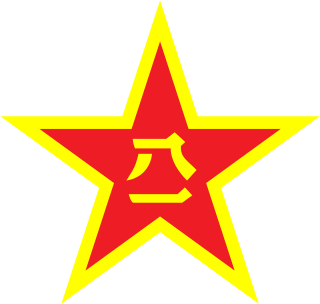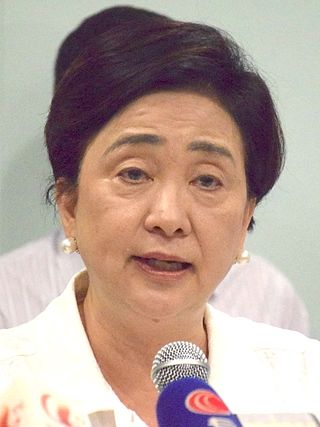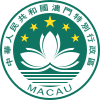Politics of Macau is a framework of a politically constrained multi-party presidential system, dominated by the People's Republic of China. It includes the legislature, the judiciary, the government, and a multi-party system. Executive power is exercised by the government, led by the Chief Executive.

The People's Liberation Army Macao Garrison is a garrison of the People's Liberation Army (PLA), responsible for defense duties in the Macau Special Administrative Region (SAR) since the sovereignty of Macau was transferred to China in 1999.

Edmund Ho Hau Wah, GOIH, GML, GCM is a Macau politician who served as the first Chief Executive of the Macau Special Administrative Region from 1999 to 2009. He currently serves as a Vice-Chairman of the Chinese People's Political Consultative Conference.

The Chief Executive of the Macao Special Administrative Region is the head of government of Macau, a special administrative region of China. The position replaced the office of Governor of Macau, the former head of Macau as an overseas province of Portugal. Under the Basic Law of Macau, the chief executive's role is to:
...be the head of the Macau Special Administrative Region and shall represent the Region. The Chief Executive of the Macau Special Administrative Region shall be accountable to the Central People's Government and the Macau Special Administrative Region in accordance with the provisions of this Law.
Macau elects at the regional level its head of government and legislature. The Legislative Assembly is made up of 33 members, of whom 14 are elected by popular vote under proportional representation, 12 elected from functional constituencies and 7 appointed by the Chief Executive. The Chief Executive of Macau is returned by a 400-member Election Committee on five-year intervals.
The Government of the Macau Special Administrative Region, are headed by secretariats or commissioners and report directly to the chief executive. The affairs of the government are decided by secretaries, who are appointed by the chief executive and endorsed by the State Council of the Central People's Government in Beijing. As a special administrative region of China, Macau has a high degree of autonomy, in light of the "One Country, Two Systems" policy. The Macau Government, financially independent from the Central People's Government, oversees the affairs of Macau.

The Hong Kong and Macau Work Office (HKMWO) is an administrative agency of the Central Committee of the Chinese Communist Party and the State Council of the People's Republic of China, responsible for promoting cooperation and coordination of political, economic, and cultural ties between mainland China and the Chinese Special Administrative Regions of Hong Kong and Macau. Under the Party and state reforms adopted in 2023, the HKMAO of the State Council will become the external name of the "Hong Kong and Macau Work Office of the Central Committee of the Chinese Communist Party".
Legislative elections were held in Macau on 15 September 2013 according to the provisions of the Basic Law of Macau. This election was the first of its kind succeeding the reform of the Legislative Assembly that created four new seats; two new geographical constituency seats and two new functional constituency seats. Out of a total of 33 seats, 14 were elected by universal suffrage under the highest averages method, while 12 were voted on from the Functional constituency, and 7 from nomination by the Chief Executive.

Ho Iat Seng • is a Macau politician serving as the third and current chief executive of Macau since December 2019.

The Democratic Party leadership election was held on 14 December 2012 for the 30-member 11th Central Committee of the Democratic Party in Hong Kong, including chairperson and two vice-chairperson posts. Incumbent Chairperson Emily Lau secured her post against three other candidates after two rounds of election.
The election for the Hong Kong deputies to the 11th National People's Congress (NPC) was held on 25 January 2008. 36 Hong Kong deputies were elected by an electoral college composed of 1,234 members.

The 2022 Hong Kong Chief Executive election was held on 8 May 2022 for the 6th term of the Chief Executive (CE), the highest office of the Hong Kong Special Administrative Region (HKSAR). Incumbent Carrie Lam, who was elected in 2017, declined to seek a second term for family reasons and finished her term on 30 June 2022. Former Chief Secretary John Lee was the sole candidate approved by the central government of China in the election and the only candidate to be nominated. He received 1,416 electoral votes (99.44%) and assumed office on 1 July 2022.
The election for the Hong Kong deputies to the 13th National People's Congress (NPC) was held on 19 December 2017. 36 Hong Kong deputies were elected by an electoral college composed of 1,989 members.
Legislative elections were held in Macau on 12 September 2021. This legislative election will return 33 members of the Legislative Assembly of Macau, with 14 directly elected by all electorates, 12 indirectly elected by special interest groups and 7 appointed by the Chief Executive 15 days after the announcement of the election results.
Chief Executive elections were held in Macau on 29 August 2004 for the second term of the Chief Executive of Macau (CE), the highest office of the Macau Special Administrative Region. Incumbent Chief Executive Edmund Ho was re-elected unopposed.
Chief Executive elections were held in Macau on 26 July 2009 for the third term of the Chief Executive of Macau (CE), the highest office of the Macau Special Administrative Region. Fernando Chui was elected without contest after incumbent Chief Executive Edmund Ho was ineligible for re-election due to having served two terms.
The 2019 Macanese Chief Executive election was held on 25 August 2019 for the 5th term of the Chief Executive of Macau (CE), the highest office of the Macau Special Administrative Region. Incumbent Chief Executive Fernando Chui, who was re-elected once already, was not eligible to run for the office under Macao Basic Law, the mini-constitution of the territory. Ho Iat-seng, former President of the Legislative Assembly of Macau, won as the sole candidate of the election.
Paula LingHsiao Yun is a Portuguese-born Chinese lawyer and politician in Macau. She was elected the deputy to represent Macau in the National People's Congress in 2008, has served on the committee to select Macau's Chief Executive, on the committee for Macau's Basic Law, and on Macau's Election Committee. In 2020, Macau Business listed her as one of the twenty most influential women in Macau.
The election for the Hong Kong deputies to the 14th National People's Congress (NPC) was held on 15 December 2022. 36 Hong Kong deputies were elected by an electoral college composed of 1,420 members.
A by-election was held for the Election Committee constituency in the Legislative Council of Hong Kong on 18 December 2022 after resignation of four Legislative Councillors appointed to the new government led by Chief Executive John Lee Ka-chiu.








